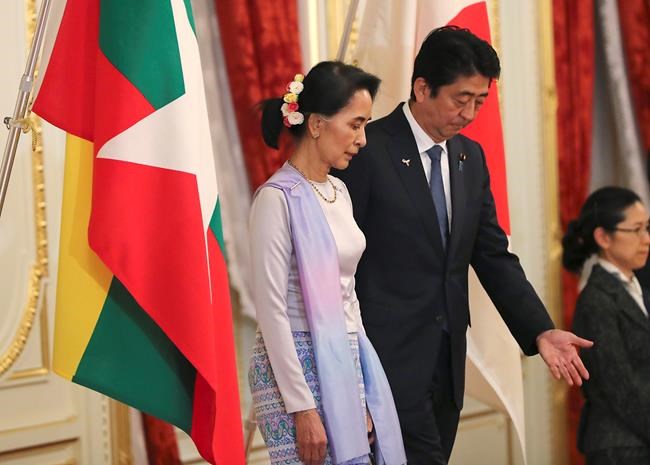Elevate your local knowledge
Sign up for the iNFOnews newsletter today!
Sign up for the iNFOnews newsletter today!
Selecting your primary region ensures you get the stories that matter to you first.

TOKYO – Japanese Prime Minister Shinzo Abe held talks with Myanmar leader Aung San Suu Kyi on Wednesday and pledged 40 billion yen ($390 million) in aid to back her government’s peace process with ethnic minorities, amid growing international concern about reported army attacks on a Muslim group.
Abe told Suu Kyi that Japan fully supports her efforts at political change and offered to back her country’s development of infrastructure, agriculture and education. He promised additional support for the peace process with minority groups and economic development in their areas.
“It is our hope that this would provide a major strength to back reconciliation efforts across Myanmar,” Abe told a joint news conference with Suu Kyi after their talks at the State Guest House.
The two leaders, however, did not discuss recent reports of rapes and murder of ethnic Rohingya Muslims by the military, Deputy Chief Cabinet Secretary Koichi Hagiuda told reporters.
Although they have lived in Myanmar for generations, Rohingya are barred from citizenship and instead live as some of the most oppressed people in the world. Since communal violence broke out in 2012, more than 100,000 Rohingya have been driven from their homes to live in squalid camps guarded by police.
Myanmar government officials have denied the reports of army attacks on Rohingya, and presidential spokesman Zaw Htay said Monday that United Nations representatives should visit “and see the actual situation in that region.” The government has long made access to the region a challenge, generally banning foreign aid workers and journalists.
Suu Kyi’s government held peace talks in August with many of the major ethnic groups that make up 40 per cent of the country’s population. Some of the groups have fought for decades to seek greater autonomy.
The assistance for minority groups will be part of an 800 billion yen ($7.8 billion) Japanese package that includes private and government investment and economic assistance over five years. Abe said the keys to Myanmar’s economic development are private investment, employment expansion and human resources.
“This assistance would surely contribute to our peace process and nation-building effort,” Suu Kyi said. “The peace process and economic development are inseparable.”
Earlier Wednesday, Suu Kyi received a passionate welcome from hundreds of her countrymen in Japan and sought their support in promoting development in their country.
She told them that it takes time to reform the Myanmar government, but she is continuing to work on it.
Many Myanmar residents in Japan fled their country during more than five decades of military rule, which ended when Suu Kyi’s party took power more than five months ago. But despite the recent political changes, many say they are still cautious.
During her five-day visit, Suu Kyi is to meet with Japanese business leaders to seek investment. She also will travel to Kyoto to be awarded an honorary doctorate from Kyoto University, where she was a visiting scholar for one year.
___
Follow Mari Yamaguchi on Twitter at twitter.com/mariyamaguchi
Her work can be found at http://bigstory.ap.org/content/mari-yamaguchi
This site is protected by reCAPTCHA and the Google Privacy Policy and Terms of Service apply.
Want to share your thoughts, add context, or connect with others in your community?
You must be logged in to post a comment.